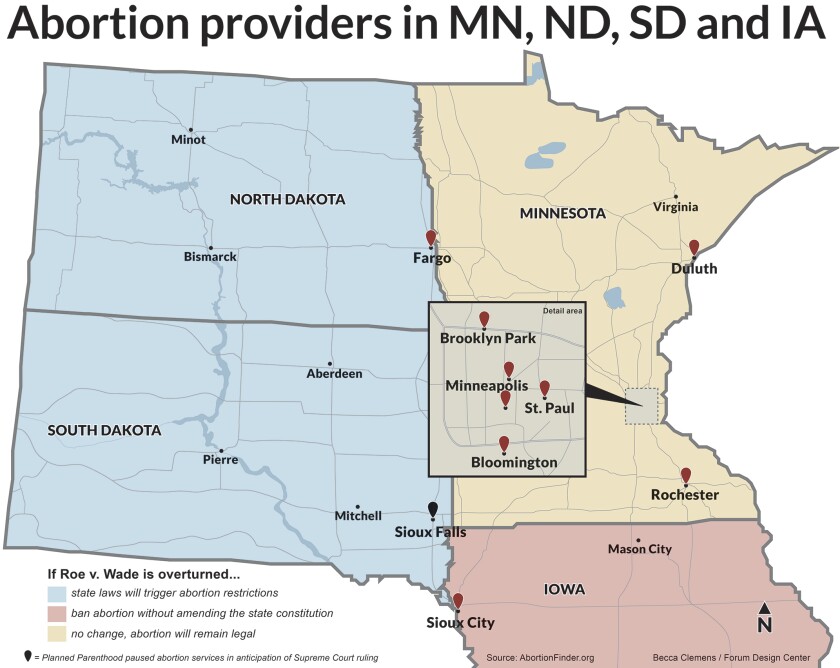ST. PAUL – Gov. Tim Walz today signed an emergency executive action to protect reproductive health care services in Minnesota, for residents and those from other states seeking care here.
Walz signed Emergency Executive Order 22-16,entitled "Protecting Access to Reproductive Health Care Services in Minnesota,"early Saturday.
ADVERTISEMENT
Under the Minnesota Constitution, abortion remains legal in Minnesota, but Minnesota’s neighboring states are expected to severely restrict abortion following the which ensured a woman's constitutional right to abortion and legalized it nationwide.
By erasing abortion as a constitutional right, the ruling restored the ability of states to ban it. Twenty-six states are either certain or considered likely to ban abortion.

The Supreme Court's decision triggered laws in Minnesota’s neighbors to the west — and — that ban abortions in those states. South Dakota's ban goes into effect immediately, and North Dakota's will go into effect in one month.
In a 1995 case, the Minnesota’s Supreme Court, upheld the right to an abortion under the state’s constitution, so the U.S Supreme Court’s decision wouldn’t affect the state’s restrictions. But Minnesota clinics could now see an influx of people from neighboring states coming across the border for abortion services.
The executive action by Walz, was issued in part, to help protect residents of those 26 states, from being penalized for traveling to Minnesota to seek care.
The order states: "To the maximum extent permitted under the United States and Minnesota Constitutions and Minnesota law, the Governor will decline to honor requests to extradite individuals who are accused of committing acts related to reproductive health care that are not criminal offenses in Minnesota."
ADVERTISEMENT
To the maximum extent permitted under the United States and Minnesota Constitutions and Minnesota law, the Governor will decline to honor requests to extradite individuals who are accused of committing acts related to reproductive health care that are not criminal offenses in Minnesota
While no state currently has an abortion travel ban on the books, lawmakers in states with restrictive abortion laws have floated such restrictions.
Abortion opponents said despite the latest U.S. Supreme Court ruling and Walz's Executive Action, they would continue pressing Minnesota lawmakers to restrict access to abortion services in the state.
“Sadly, in Minnesota, that future is more distant than it is in some more forward-looking states. Minnesota’s 1995 Doe v. Gomez decision ensures that abortion will not disappear immediately from our state,” said Renee Carlson, an attorney affiliated with Minnesota Family Council, a conservative Christian lobbying group. “The work to protect women and children in Minnesota from abortion at the Legislature and in the courts is needed now more than ever.”
GOP-endorsed candidate for governor Scott Jensen told Minnesota Public Radio in March that if he is elected he would seek to ban abortion. He said the one exception to the ban would be to protect the life of the mother. In May, when WCCO radio asked him "no exceptions for rape or incest?" Jensen answered, "unless a mother's life is in danger."
In a Friday statement, Jensen said if elected he would "seek out loving and caring alternatives like universal adoption, family planning measures to prevent pregnancies and policies like counseling and alternative referrals, medical assistance and other measures that value people — both born and unborn."
Jensen's running mate Matt Birk has said he opposes abortion in all cases, including rape and incest.
"Abortion is not going to heal a rape victim. It will only make things worse,” Birk told an audience at the National Pro-Life Summit in January 2020.
ADVERTISEMENT
Walz's executive order is effective immediately and will remain in effect until it is rescinded or expires under Minnesota statutes.
“My office has been and will continue to be a firewall against legislation that would reverse reproductive freedom,” said Governor Walz. “This order shows our administration’s commitment to protecting patients and health care providers. Our administration is doing everything we can to protect individuals’ right to make their own health care decisions.”
by on Scribd








